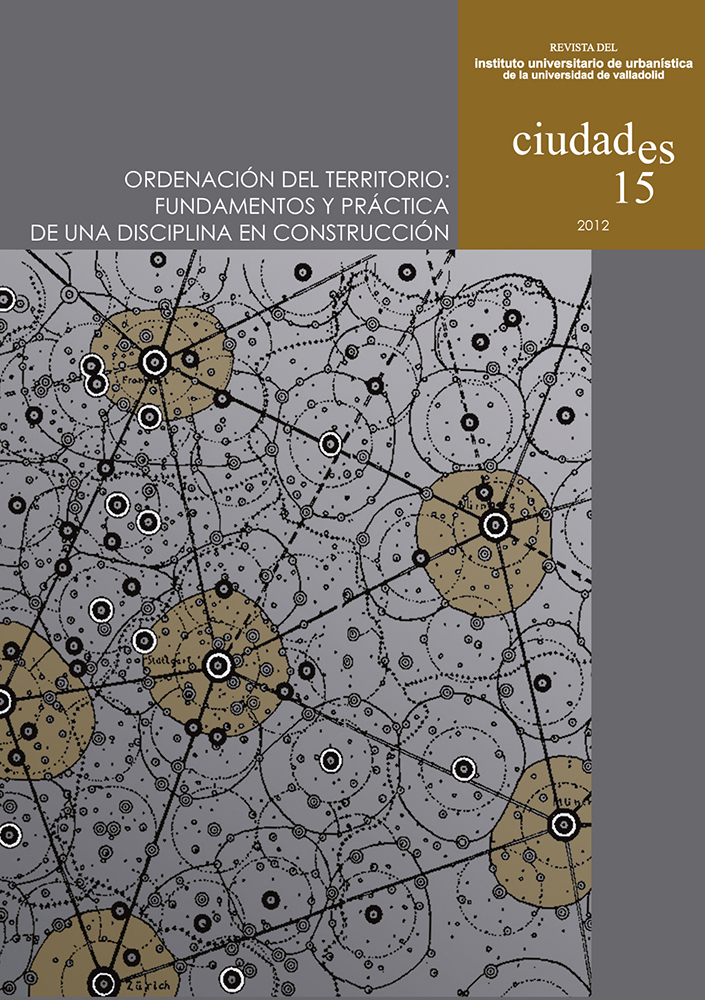“REGIONAL PLANNING:
fundamentals and practice of a discipline under construction”
In this monographic section of Ciudades 15 (2012) we propose a reflection about the current conceptual basis of spatial planning, the principles and criteria of the regional dimension of planning.
It is just when urban planning has been serving real state interests and capital gains, with indiscriminate growth and free market dominance, that is, when planning becomes the instrument of private interests instead of public services, that the need, the lack, the impossibility or the lightness of regional planning have been felt most visibly.
Throughout the twentieth century quite a few certainly different elements, ideas and thoughts have been developed with unequal success in relation to regional planning, some of them resulting sometimes very powerful but not always accurate nor even socially beneficial: the geographical areas identity and medium-society relationship, the city planning in its regional context, the different scaled argument of design with nature, the settlement understood as urban system, the theories on industrial location and agglomeration economies, the industrial centers’ conjecture, the resources rational exploitation principle and its recent understanding as sustainable development, the link and the commitment of sectorial policies in respect to major infrastructure networks, the images of territorial unity, of city- country balance and of small towns’ support, the urban neighborhoods polycentric development idea, the functional polycentric concept versus territories economic polarization, the local development and facility centers ideas, the governance concept or territories and landscapes custody, the territorial equity notion, the sustainable mobility principle, the climate change combat strategy, the cross-border cooperation idea, the comparative profit and cities and regions competitiveness planning, the social and territorial fashionable notion of cohesion, and so others.
In the period between the “European Charter for Regional/Spatial Planning” in 1983, when the subject was beginning to make technical, methodological and normative progress in the western world, and the Spanish manifesto “Towards a new culture of the territory” in 2006, when the highest level of the Spanish disastrous large urban growth had been reached, huge urban change has taken place in cities and territories, not only in developed countries, but also in both emerging economies and the most depressed countries.
In addition, some technical goals have also had academic influence, such as Rio Declaration on Environment and Development (1992), the European Spatial Development Prospective (1999), The European Landscape Convention (2000), Guiding Principles for Sustainable Spatial Development of the European Continent (2000) and the Leipzig Charter on Sustainable European Cities (2007), although the ambiguity in their possibilities, the use of a politically correct language and the wide range of application settings will probably limit their potential severely.
Nowadays we can at least distinguish between the following perspectives of Regional Planning:
- the “regional planning” as a matter concerning spatial planning (regional planning as a strictly academic, legal and jurisdictional standpoint) in a supramunicipal scale and based on specific legal instruments,
- the “land administration” as a matter concerning local government, authorities and management (i.e., “territorial government” including the regional tutelage over the local management itself, focused on service delivery), that is, in relation to issues such as municipal map, provincial councils role, the regionalization, the zoning for specific services provision, etc.
- the “regional development planning” and the “strategic planning”, as socio-economic improvement implementation in a fairness and balance context, or else as sustainable development paradigm implementation, or more frequently as competitiveness and endogenous develop encouragement tool (i.e., a “development planning” that indicates and encourages the local development model, where the territory is the development hardware), and
- the “sectorial policies” as effective regional planning (through plans or, more often, projects that actually arrange the territories, even more than previous modes: infrastructure networks and related systems, industrialization policies, fiscal, pricing and customs policies, agricultural policy, mining policy, etc.). It is, therefore, a really wide world, but interrelated, with many transversal connections.
Ciudades magazine sets the need for reviewing the existing Regional Planning background and practice, not as much for searching the explanation of planning instruments and their secrets, as for looking into their philosophical conception, their socio-political or ideological bases, their technical background and their real scopes (that is, political consciousness and their limitations: their successes and failures) and their necessities, including the intrinsic potential conflict with local government, the innovation, technological resources or methodological advances, their interrelationship with urban planning, environment and risk prevention, the challenges of the landscape protection and management, etc., in short, the possibility of territories management and governance.
Valladolid, June, 2012.

